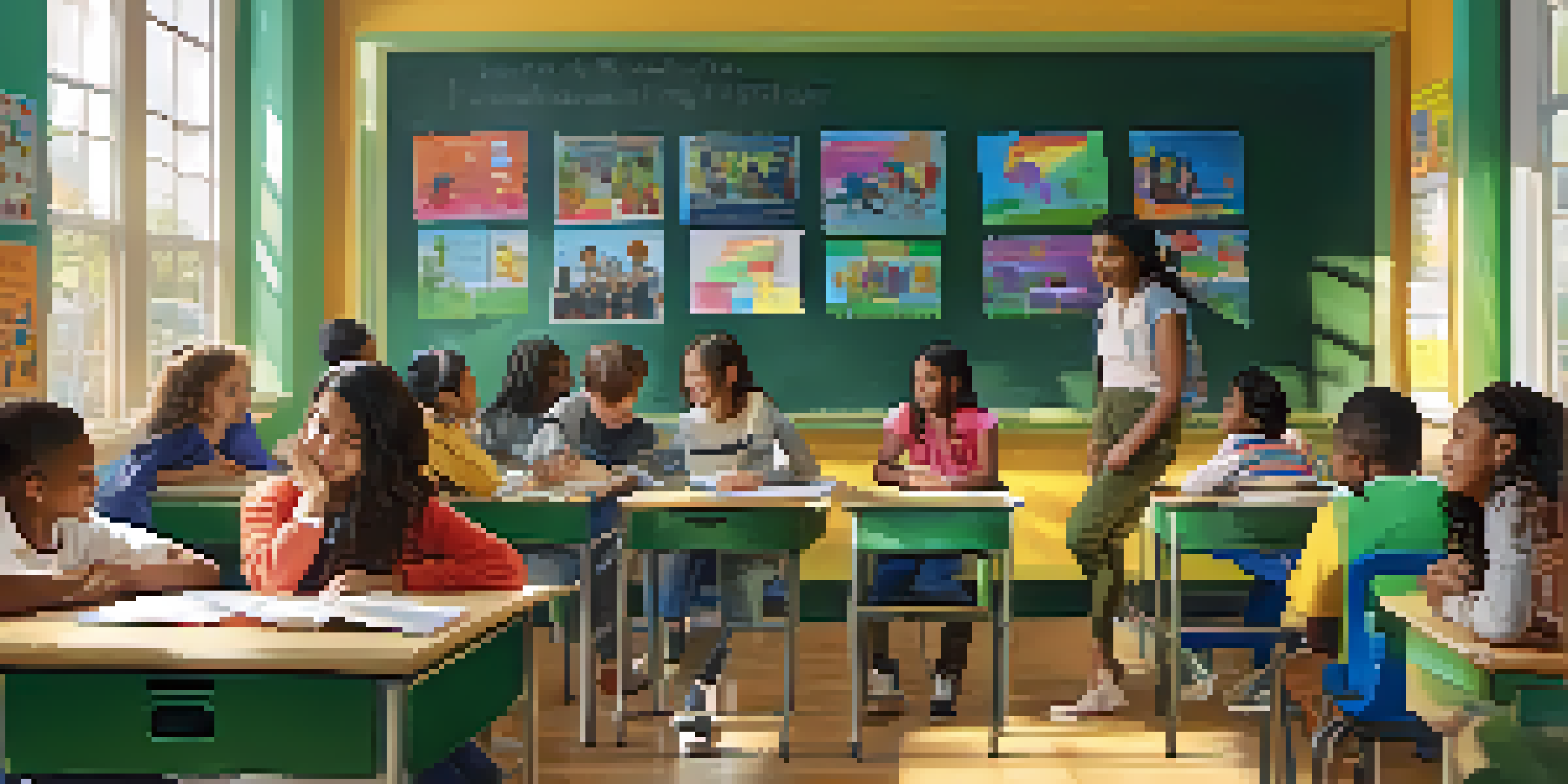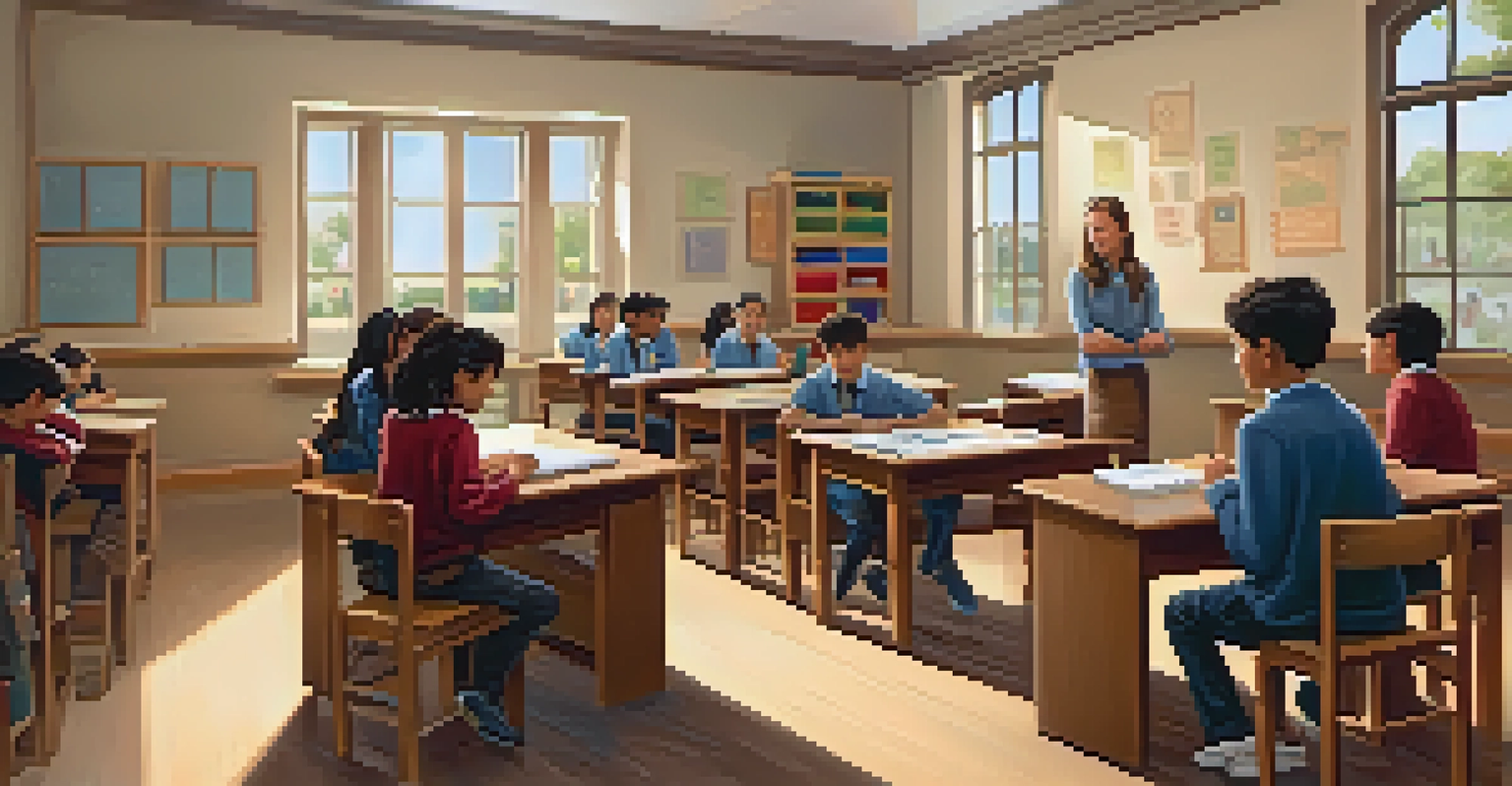Comparing Public vs. Private Schools in Jersey City: Pros and Cons

Understanding Public Schools in Jersey City
Public schools in Jersey City are funded by state and local taxes, making them tuition-free for residents. They provide education to a diverse student body, reflecting the community's demographics. This inclusivity can enhance social skills and cultural awareness among students.
Education is the most powerful weapon which you can use to change the world.
One of the key advantages of public schools is the availability of special education services and resources mandated by law. They often have programs designed to cater to various learning needs, ensuring that all students receive support. Additionally, public schools typically have more extracurricular activities due to larger budgets and student bodies.
However, funding disparities can lead to differences in quality across public schools. Some may struggle with overcrowded classrooms or outdated facilities, which can impact the overall learning environment. It's essential for parents to research specific schools to understand their strengths and weaknesses.
Exploring Private Schools in Jersey City
Private schools in Jersey City operate independently of the public school system and charge tuition fees. This financial model allows them to offer smaller class sizes and personalized attention, often leading to enhanced academic performance. Many parents appreciate the tailored educational experiences private institutions can provide.

Another appealing aspect of private schools is their ability to create specialized curricula, including advanced placement courses or unique teaching philosophies. This flexibility can attract families seeking specific educational approaches or religious affiliations. Moreover, private schools typically have more resources for enrichment programs and extracurricular activities.
Public Schools Offer Free Education
Public schools in Jersey City provide tuition-free education funded by state and local taxes, making them accessible to all residents.
On the flip side, private schools may lack the diversity found in public schools, as they often serve a more homogeneous population. Additionally, the cost of tuition can be a barrier for many families, limiting access to quality education. It's important for parents to weigh these factors when considering private schooling options.
Academic Performance: Public vs. Private
When it comes to academic performance, many studies show that private schools often have higher standardized test scores compared to public schools. This trend can be attributed to various factors, including smaller class sizes and more engaged parents. However, it's crucial to consider that these results can vary significantly from one school to another.
The beautiful thing about learning is that no one can take it away from you.
Public schools can also produce excellent academic outcomes, especially those that are well-funded and have strong support systems in place. For instance, schools with robust tutoring programs and dedicated teachers can help students excel academically. The key is to look beyond generalizations and assess individual school performance.
Ultimately, academic success is influenced by a myriad of factors, including the child's learning style, parental involvement, and the specific school's approach to education. Parents should prioritize finding the right fit for their child rather than solely basing decisions on public versus private labels.
Social Environment in Public Schools
Public schools often provide a rich social environment where students can interact with peers from various backgrounds. This exposure helps develop social skills and prepares students for real-world situations. The diverse setting encourages empathy and understanding among different cultures and viewpoints.
Additionally, public schools frequently host community events, fostering a sense of belonging and engagement among families. These connections can be vital for creating a supportive educational ecosystem. Students benefit from learning to collaborate and communicate with a wide range of individuals, enhancing their interpersonal skills.
Private Schools Provide Personalized Learning
Private schools charge tuition but offer smaller class sizes and specialized curricula, enhancing individual student attention and support.
However, larger class sizes may lead to challenges in forming close relationships with teachers and peers. Some students might feel lost in the crowd, which can impact their overall school experience. It's important for parents to assess how well their child might adjust to this environment.
The Social Scene in Private Schools
Private schools often create more tightly-knit communities, which can foster strong relationships among students and staff. With smaller class sizes, teachers can provide more individualized attention, helping students feel valued and supported. This close environment can lead to lasting friendships and a sense of belonging.
Many private schools also emphasize character education and community service, encouraging students to develop leadership skills and a sense of responsibility. These values can be integral to a child's development and future success. Parents often appreciate the holistic approach to education that many private institutions offer.
However, the exclusivity of some private schools can result in a lack of diversity, which may limit students' exposure to different perspectives. It's essential for families to consider how important social diversity is for their child's growth when evaluating private school options.
Cost Considerations for Public Schools
One of the most significant advantages of public schools is that they are free to attend, making them a more accessible option for many families. This means that parents can save money on tuition while still providing their children with a quality education. Additionally, public schools are funded by tax revenues, ensuring that they remain a viable option for all residents.
Public schools often provide various resources and programs at no additional cost, including transportation and free or reduced-price meals for qualifying families. This financial aspect can relieve some of the burdens associated with education costs. Families can also benefit from the community support that public schools typically receive.
Consider Financial Implications
While public schools are free, private schools may offer financial aid, necessitating careful consideration of costs versus educational benefits.
However, funding limitations can lead to challenges, such as insufficient resources or outdated facilities. Parents should be aware of the financial health of their local public schools and how that might impact their children's education. Researching specific schools can offer insights into the types of support and opportunities available.
Tuition and Financial Aid in Private Schools
Tuition for private schools can be a significant investment, often ranging from several thousand to tens of thousands of dollars per year. While this cost can be daunting, many private institutions offer scholarships and financial aid programs to help alleviate the financial burden. This support can make private education more accessible for families who might otherwise struggle to afford it.
It's essential for parents to research the financial aid options available at private schools they are considering. Many schools have dedicated staff to assist families in navigating the application process and understanding eligibility requirements. This resource can be invaluable in making a private school education a reality for many students.

Ultimately, the decision to invest in private schooling should be made with careful consideration of the potential return on investment. Parents should weigh the benefits of smaller class sizes, specialized programs, and overall school culture against the financial commitment required. This thoughtful approach can lead to a more informed decision.